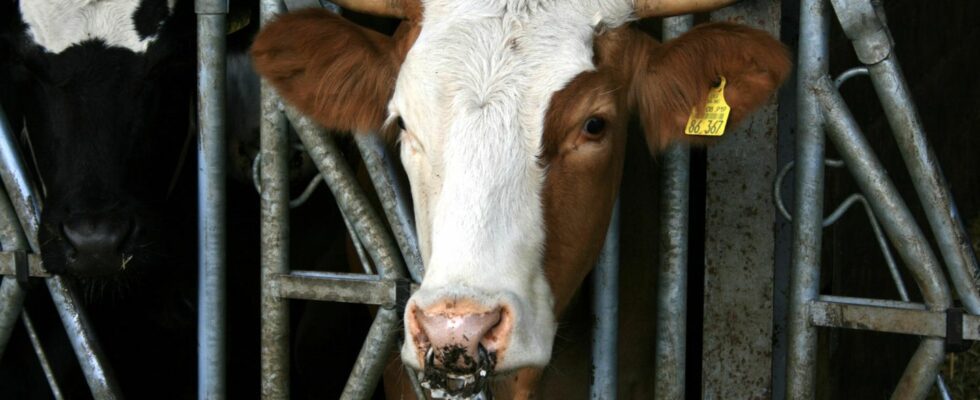mad cow disease
Case of BSE detected in a Dutch cow
© Gerisch / Adobe Stock
News in February that moves us: BSE and bird flu – there are new cases +++ NRW and Hamburg are lifting the mask requirement +++ The isolation requirement for corona sufferers is partially omitted
The most important news in the BRIGITTE ticker
What moves the world? What moves the BRIGITTE editors? In this ticker we summarize the most important news in February for you.
February 2, 2023
BSE and bird flu – new cases and mutations
A cow suffering from mad cow disease was discovered on a Dutch farm. The Ministry of Agriculture informed the Parliament in The Hague. When the carcass was checked, the disease BSE (bovine spongiform encephalopathy) was found. The affected yard was cordoned off – neither manure, meat nor animals are currently allowed to leave the yard. The control authorities now want to track down the calves of the infected animal – which unfortunately have to be killed. The same applies to the animals that have been given the same food.
The BSE variant that has now been discovered is the atypical one. This can appear spontaneously in old animals, the ministry said. The last time there was such a case was in the Netherlands in 2011. BSE is an animal disease commonly known as mad cow disease. It is a brain disease.
In addition to another case of BSE, the avian influenza H5N1 is rampant among wild birds – zoos and farms in central Germany are also increasingly affected. In the Börde district, 20,000 animals had to die in a turkey breeding facility. Half of them were killed for security reasons. The pathogen had previously also been detected in birds in the zoo in Bad Kösen and in the mountain zoo in Halle.
Although there had previously been isolated transmissions of bird flu to humans, most of them were mild. Human-to-human transmission is not known to date. However, scientists are now particularly concerned about the outbreak of avian influenza on a Spanish mink farm. Some mink became infected in wild birds last year. The virus spread quickly. In the end, 52,000 animals had to be culled for safety reasons.
During the investigations it turned out that it was already a gene mutation of the H5H1 virus. This probably caused the widespread distribution among the animals. Researchers now fear that the previous genetic barrier to animal-to-human and then human-to-human transmission could be broken. It is feared that mink could become an intermediate host for H5N1 influenza, allowing transmission between birds, mammals and humans.
February 1, 2023
Masks are not compulsory in other federal states
In Hamburg and North Rhine-Westphalia, the obligation to wear a mask in local transport ends. From February 2nd, this will also apply to long-distance transport. With the easing, the federal states are returning to some normality after almost three years of the pandemic. Thuringia will follow on February 3rd as the last federal state to eliminate the obligation to wear a mask in public transport.
“The corona protection measures, which have been in effect since October, have been successful. Because of these protective measures, the pandemic in autumn and winter has so far been within a controlled framework. The health system and critical infrastructure were not overloaded,” says a statement by the federal government. According to the federal government, the step to suspend the obligation to wear masks in long-distance public transport was “carefully considered”.
However, the federal corona rules still apply until April 7th. After that, the mask requirement for patients and visitors in medical practices will be lifted. In Bavaria, employees in medical practices and other outpatient medical facilities were already allowed to take off their masks on Wednesday. The reason for the earlier easing is the more relaxed situation, as there was no dangerous winter wave and such a risk is no longer feared.
The obligation to isolate will be lifted in other parts of Germany
With the start of February, the five-day isolation requirement for corona infected people in North Rhine-Westphalia, Lower Saxony, Hamburg, Saxony, Bremen and Saxony-Anhalt will fall. It had already been abolished in Hesse and Saarland. Thuringia and Saxony want to follow suit in the coming days. In Berlin, Brandenburg and Mecklenburg-Western Pomerania, there is still a five-day isolation requirement. CDU politician Karl-Josef Laumann emphasized that the principle of personal responsibility and consideration for other people is now all the more important. He made it clear that sick people should stay at home.
Even more news
That was the news in January 2023.
Sources used: bundesregierung.de, tagesschau.de, deutschlandfunk.de, mdr.de, spiegel.de
